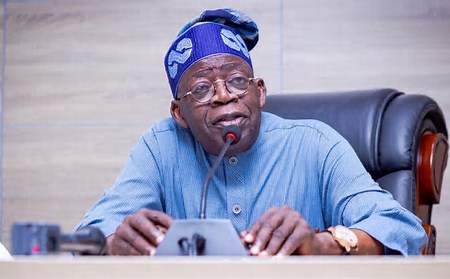50 Years of Waste: How Nigeria Squandered the Wealth of Future Generations
50 Years of Waste: How Nigeria Squandered the Wealth of Future Generations
By Achimi muktar
For half a century, Nigeria lived beyond its means, spending money that belonged to generations yet unborn. That was the stark reality President Bola Ahmed Tinubu painted as he defended his administration’s tough economic reforms.
Speaking at the State House in Abuja on Thursday while hosting former National Assembly colleagues from the aborted Third Republic, Tinubu revealed how Nigeria’s reckless financial decisions jeopardized the future.
“For 50 years, Nigeria was spending the money of generations yet unborn and servicing the West Coast of our subregion with fuel. It was getting difficult to plan for our children’s future.”
The President didn’t mince words about the dire situation he inherited. According to him, when he assumed office, Nigeria was on the brink of financial collapse.
“We faced serious headwinds when I took over—very challenging times. Nigeria would have been bankrupt if we had not taken the actions that we took.”
His government, he argued, had no choice but to implement painful but necessary economic policies to prevent total economic ruin.
A Light at the End of the Tunnel?
Despite widespread hardship, Tinubu assured Nigerians that his reforms are beginning to yield results.
“Today, we are sitting pretty on a good foundation. We have reversed the problem; the exchange rate is stabilizing. Food prices are coming down, especially during Ramadan. We will have light at the end of the tunnel.”
His words will likely be met with skepticism by struggling Nigerians who have borne the brunt of soaring inflation, subsidy removal, and currency devaluation.
Democracy and the Path Forward
Beyond economics, Tinubu emphasized the importance of democracy, recalling how he and his colleagues fought for Nigeria’s democratic future.
“Some leadership failed, but we kept the faith with our democratic beliefs, freedom, and the right to aspire to the highest office in the land. I am benefitting from it.”
His remarks come as his administration faces mounting pressure over economic hardship, insecurity, and governance issues.
Backing from Former Lawmakers
Despite criticisms from various quarters, Tinubu received a vote of confidence from his visitors. Speaking on behalf of the delegation, Senator Emmanuel Chiedoziem Nwaka praised the administration’s policies, particularly the Nigerian Education Loan Fund (NELFUND) and the Nigerian Consumer Credit Corporation (CREDICORP).
“I appreciate you for what you are giving to students because the student population is the largest demographic in the country. Many have benefited from it.”
He also hailed CREDICORP as a major tool in fighting corruption by making credit accessible to young professionals.
Other members of the delegation included Sen. Bako Aufara Musa, Hon. Terwase Orbunde, Hon. Wasiu Logun, Hon. Amina Aliyu, High Chief Obi Anoliefo, and Hon. Eze Nwauwa.
The Big Question: Is Nigeria on the Right Track?
While Tinubu remains optimistic, millions of Nigerians still struggle with high costs of living and economic uncertainty. His administration’s ability to truly reverse decades of financial recklessness remains to be seen. For now, many are left wondering: Has Nigeria finally learned from its past, or is history doomed to repeat itself?






















